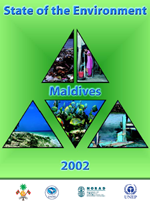Even though the Maldives contributes less than 0.01% to global emission of GHGs, the Maldives is in fact one ofthe most vulnerable countries to climate change and sea level rise. The seven main areas of vulnerability to climatechange observed are land loss and beach erosion, infrastructure damage, damage to coral reefs, impact on theeconomy, food security, water resources, and human health. Local air pollution in Malé, has become a growingconcern, but the air quality of the Maldives is mainly affected by transboundary air pollution.
The management of solid waste has been emerged as a critical issue. Inadequate facilities to deal with solid wastes,besides access to safe water and sanitation, have hampered basic societal structure. Where freshwater is already avery scare resource, the superficial hydrogeology of groundwater aquifers have been contaminated by sewage,chemicals, and pathogens. Improper sewage disposal facilities have resulted poor groundwater quality.While marine biodiversity is the most significant and vital resource base for the country, the livelihood has traditionallybeen marine based putting tremendous pressure on marine resources.
The marine resources continue to be themain generator of food, earnings, employment, and shelter. Coral mining for housing construction and highdemand in the international market for certain reef species has exerted enormous pressure on the islands biodiversity.Mining of corals have also resulted considerable amount of beach erosion and other adverse environmentalimpacts such as migration of residential reef fish communities and other living organisms.While natural resource base such as coastal and marine resources and the tourism provide a great opportunity foreconomic development and prosperity in Maldives, there is a need of considering appropriate policy packages,determined actions, and ecologically sound technologies, to ensure environmental security and sustainability for thepresent as well as future generations.


